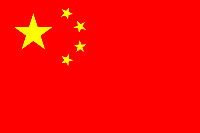China's economy slows down
Tightening measures reduced speed of China's quick-growing economy in the third quarter. The peak of the latest boom has passed, economists reported .

The 11.5 percent jump in economic output for the three months through September kept China on track to surpass Germany as the world's third-largest economy by early 2008.
The growth figure, a decline from the 11.9 percent rate reported for the previous quarter, suggests China's expansion has peaked, economists said. They said growth is expected to slow further but stay above 10 percent next year.
"The shift down in growth _ albeit mild _ has the economy heading in the right direction," analyst Daniel Melser of Moody's Economy.com said in a report to clients. "Growth had got to an unsustainably high level on the back of surging trade revenues. But this appears now to have slowed."
Chinese leaders want fast growth to ease poverty. But they worry that the rapid expansion and an export boom that is sending money flooding through the economy are driving overspending on factories, real estate and other assets that could ignite a financial crisis.
Beijing has raised interest rates five times this year to curb double-digit investment growth, and economists expect one more hike before 2008.
"Due to macro-economic controls, we have turned the economy from being an overheating one to being one of speedy growth," a spokesman for the National Bureau of Statistics, Li Xiaochao, said at a news conference to announce the growth figures.
Also in September, inflation eased slightly, with consumer prices up 6.2 percent over the same month last year, down from an 11-year high of 6.5 percent in August, the government said.
Authorities have blamed a recent spike in inflation on a shortage of food items, especially pork. They say it should ease as government efforts to encourage farmers to raise more pigs take effect.
Chinese leaders "have managed to weather this latest inflation spike storm and are headed for smoother sailing," said Tim Condon, chief Asia economist for Dutch bank ING.
Condon said he expected growth to ease further while staying above 11 percent this year and falling to 10.5 percent in 2008.
Bank Paribas economist Chen Xingdong said he expected growth in 2008 to decline by 1 to 2 percentage from this year's rate.
Total third-quarter economic output was 16.6 trillion yuan (US$2.2 trillion; Ђ1.6 trillion), according to the statistics bureau.
China's unexpectedly strong expansion has prompted analysts to raise forecasts for this year's growth to as high as 11.5 percent. It would be the fifth straight year of double-digit expansion.
China is on track to overtake Germany in December or early in 2008 as the world's third-largest economy after the United States and Japan. But per capita income for China's population of 1.3 billion people will still be far smaller than that of those economies.
China reported total economic output last year of 21.1 trillion yuan, or US$2.7 trillion (Ђ2.1 trillion), compared with Germany's US$3 trillion (euro2.3 trillion). Germany is forecasting 2.3 percent growth this year, well below China's brisk rate.
Li, the statistics bureau spokesman, said the government also is making progress in efforts to ease dependence on exports by encouraging Chinese consumers to spend more.
Retail sales in the first nine months of the year rose 15.9 percent, an increase of 2.4 percentage points over the growth rate for the same period last year, Li said.
"Consumption is expected to keep growing rapidly, becoming an important factor in pushing economic growth," Li said.
Beijing has tried to curb economic excesses with measures ranging from a ban on new luxury villas to taxes to discourage exports of steel and other products deemed too dirty or energy-intensive.
Still, investment in factories and other urban assets surged by 24.8 percent in September, according to the statistics bureau.
Li said China's growth should not be affected by U.S. credit market turmoil. But he said economic performance in the coming year was uncertain due to rising oil prices and a possible global slowdown.
Li said China still faces pressure from rising prices for labor and imported oil and grain.
"We can see that inflation growth is slowing down, but the pressure is still there," he said.
Subscribe to Pravda.Ru Telegram channel, Facebook, RSS!


